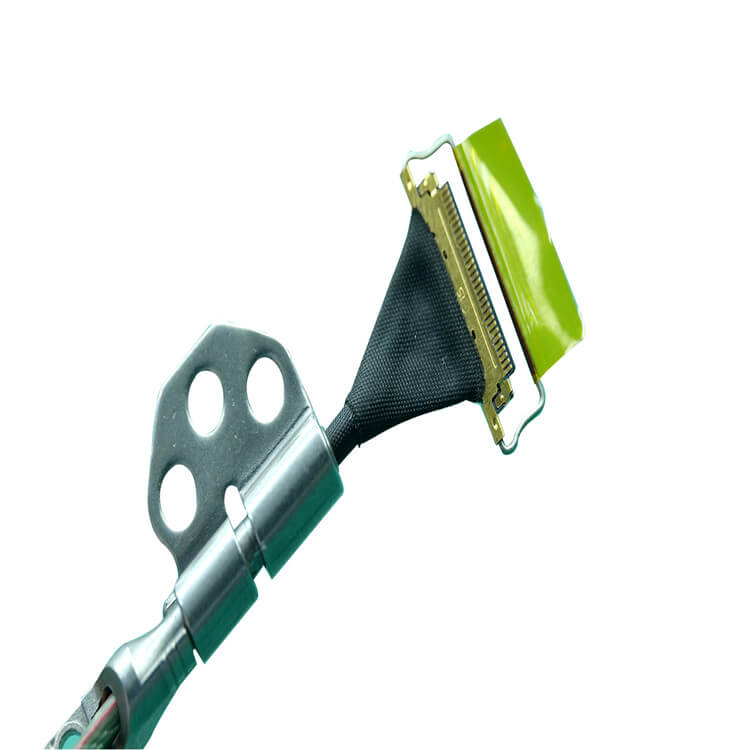In the ever-evolving landscape of electronics, the integration of flexible printed circuits (FPCs) with micro-coaxial cable technology has emerged as a game-changer. This innovative combination brings together the best of both worlds, offering enhanced performance, flexibility, and reliability for a wide range of applications.
Flexible printed circuits, as the name implies, are highly flexible and lightweight circuit boards. They are typically made from materials such as polyimide or polyester films, which provide excellent durability and flexibility. FPCs are known for their ability to be bent, folded, or twisted without compromising their electrical integrity. This makes them ideal for applications where space is limited or where components need to be connected in a flexible manner.
One of the key advantages of FPCs is their high density interconnectivity. They can accommodate a large number of electrical components in a compact space, allowing for the miniaturization of electronic devices. Additionally, FPCs offer improved signal integrity due to their low resistance and capacitance characteristics. This results in reduced signal loss and interference, ensuring reliable data transmission.
Micro-coaxial cables are a specialized type of coaxial cable that are designed to meet the demands of high-frequency and high-density applications. They feature a small diameter and a multi-layered structure, consisting of a central conductor, an insulating layer, an outer conductor, and a protective jacket.
The central conductor of a micro-coaxial cable is typically made of copper or a copper alloy, which provides excellent electrical conductivity. The insulating layer, usually made of materials such as polyethylene or fluoropolymer, helps to isolate the central conductor from the outer conductor and minimize signal loss. The outer conductor, which is often a braided or solid shield, serves to protect the signal from external electromagnetic interference (EMI) and also provides a return path for the electrical current.
Micro-coaxial cables are renowned for their superior electrical performance. They offer low attenuation, high bandwidth, and excellent impedance control, making them suitable for applications that require the transmission of high-speed signals over long distances. Additionally, their small size and flexibility make them easy to integrate into tight spaces, making them a popular choice for applications such as mobile devices, medical equipment, and aerospace systems.
When FPCs and micro-coaxial cables are combined, the result is a powerful and versatile solution that offers numerous benefits. The flexibility of FPCs allows for easy routing and connection of micro-coaxial cables, enabling designers to create complex and customized circuit layouts. This integration also helps to reduce the overall size and weight of electronic devices, making them more portable and efficient.
One of the key advantages of integrating FPCs and micro-coaxial cables is improved signal integrity. The low resistance and capacitance of FPCs, combined with the excellent electrical performance of micro-coaxial cables, result in reduced signal loss and interference. This is particularly important for applications that require the transmission of high-frequency signals, such as 5G communication systems, high-speed data transfer, and radar systems.
Another benefit of this integration is enhanced reliability. The flexible nature of FPCs helps to absorb mechanical stress and vibration, reducing the risk of damage to the micro-coaxial cables. Additionally, the protective jacket of micro-coaxial cables provides an extra layer of protection against environmental factors such as moisture, dust, and electromagnetic interference. This makes the integrated solution more robust and suitable for use in harsh operating conditions.

The integration of FPCs and micro-coaxial cables has found applications in a wide range of industries, including:
When selecting an FPC-micro-coaxial cable solution, there are several factors to consider. These include:
The integration of flexible printed circuits with micro-coaxial cable technology represents a significant advancement in the field of electronics. This innovative combination offers enhanced performance, flexibility, and reliability, making it suitable for a wide range of applications. By understanding the benefits and considerations of this integration, designers can make informed decisions when choosing the right FPC-micro-coaxial cable solution for their specific needs. As technology continues to evolve, we can expect to see even more exciting applications and advancements in this area.
Our factory offers high-quality products at competitive prices
Overview of I-PEX Micro Coaxial Cable Connectors I-PEX is a global leader in micro coaxial cable solutions, specializing in high-performance IPEX micro coax connectors and micro coaxial cable assemblies. These products are designed for.
IntroductionThe High-Temperature Resistant Micro-Coaxial Cable is a cutting-edge connectivity solution engineered to deliver exceptional performance in extreme thermal environments. Combining precision engineering with advanced mate.
Feel free to reach out to us for any inquiries or orders